I toured facilities related to this multi-million dollar industry.
ATHOL, Massachusetts — “It’s legal now! Finally!”
That’s what people in many parts of the United States, as well as Canada and other nations, are saying, myself included.
To celebrate the legalization of marijuana in my state, Massachusetts, I recently used my journalist’s credentials to obtain guided tours of two facilities related to this rapidly expanding and multi-million dollar industry. Both are located just a few miles from my home. One is MassGrow, a large cultivation enterprise, and the other is Silver Therapeutics, a small retail store, properly called a dispensary.
First, some relevant background.
The main purpose of this article is to share with you what I experienced during these tours. But first, some relevant background.
The majority of states still retain the pot prohibition, but perhaps not for long. If the Democrats win the presidential election and take control of both houses of Congress, the archaic federal laws against marijuana may soon be gone. Individual states will surely follow.
Starting just about a century ago, fear-mongering, falsehoods, and distortions led to marijuana becoming illegal. Racism was also a factor because use of this herb was known to be more common among Blacks and Hispanics. Everyone interested in this history should learn about a man named Harry Anslinger, one of the villains of the past century, who is the architecture of the anti-marijuana crusade. Read about him here.
The anti-marijuana crusade that ruined many lives has become more well-known and better understood in recent years. The mass incarceration of people of color, an issue being discussed often these days, stems significantly from violation of drug laws, and those put behind bars have been mostly casual users, not big-time dealers or cartel chieftains.
Many who celebrate legalization are aging
hippies like myself.
Many who celebrate legalization are aging hippies like myself. I was arrested in 1980 for growing pot in my vegetable garden, and fortunately the consequences were minor (no jail time or criminal record — possibly a good example of my “white skin privilege”). My story is included in an entire chapter in my autobiography (reviewed in The Rag Blog by Jonah Raskin).
Jonah’s book Marijuanaland tells a more recent story about pot in Northern California. See the Rag Blog review.
The Rag is probably best known as the birthplace of the Fabulous Furry Freak Brothers, iconic 1960s comic characters created by Gilbert Shelton. The long-haired brothers were regulars in underground papers around the United States and beyond. One of the most enduring lines from the brothers is this: “Dope [pot] will get you through times of no money better than money will get you through times of no dope.”
I mention this in part because legalization of marijuana and psychedelic drugs was a significant underground press theme back then – along with opposing the Vietnam War and racism.
The dateline of this article is Athol, Massachusetts (population 11,500), a once prosperous mill town best known for two tool-making enterprises, the L.S. Starrett Co. (still functioning) and Union Twist Drill (UTD). A labor struggle in the mid-1980s led to the closure of the UTD factory after decades of making an array of metal tools.
An energetic labor historian could write an excellent thesis on what happened in Athol over decades of union and non-union shops, but I digress!
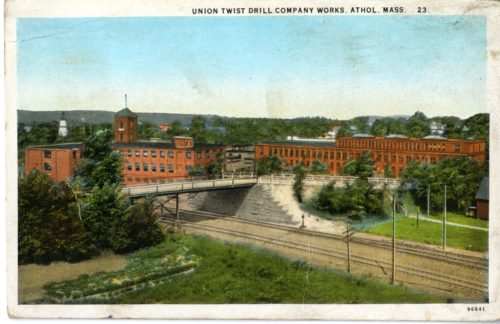
The MassGrow cultivation business is in the old Union Twist Drill factory building, shown here in a 1920s postcard.
The massive factory building that housed UTD was sold in 2018 for $1.2 million and became the site of MassGrow, the cultivation facility that I visited. The building was sold again two years later for $27 million. The purchaser was Innovative Industrial Properties, a San Diego real estate investment trust founded in 2016 as the first publicly-traded firm on the New York Stock Exchange to provide real estate capital.
Cannabis has become really big business and that is likely to continue on a global scale.
Clearly, cannabis has become really big business and that is likely to continue on a global scale. The connection of cannabis to the capitalist system is an interesting topic that has been talked about for decades. I will share one relevant memory: there were very popular rumors (not substantiated) in the 1960s to the effect that the big tobacco companies were using the trade mark system to grab well-known pot subculture names like Panama Red and Acapulco Gold. Here’s more on that topic.
As for the legal status change in Massachusetts, elected public officials are not the ones who made it happen. They no doubt felt it was too controversial. More than a decade ago, my friend Buddy Dyer and I were delegates to the Massachusetts State Democratic Convention in Worcester, and the two of us spent much of our energy approaching many politicians about legalizing marijuana with a focus on the taxation money this would bring to help government’s meet ever-growing needs. At that time, legalized casinos were being discussed, and we said that legalized pot would be a much better source of revenue. Each time, the politicians gave us no response except an embarrassed smile or chuckle, and that included a senator whom I knew had smoked pot when he was younger.
Activists placed marijuana legalization on the Massachusetts statewide ballot as referenda questions. In 2008, cannabis was decriminalized by a 63 percent vote. In 2012, medical marijuana was legalized by 60 percent, and in 2016, legalized recreational marijuana passed by 54 percent. Subsequently, the Cannabis Control Commission was formed by the legislature. Businesses then moved forward, but not very swiftly, due to a variety of issues including finances, security, health, and zoning.
It struck me as almost laughable that the Commission was spending more than $1 million just to regulate a plant. The need to hire private security professionals and pay for elaborate laboratory testing added to the cost of the product, of course, and that’s reasonable — but the bureaucratic aspects seem excessive.
I took the microphone to call attention
to this fear-mongering.
At a zoning hearing I attended in Athol – remember, it’s not a liberal college town, but a rather conservative declining mill town — there was a “fear factor” palpable as members of the public commented. I took the microphone to call attention to this fear-mongering. To make my point, I revealed my own history as someone using marijuana in moderation since my early 20s. I was the only one to speak openly in this way, though many people in the room were users. Board members and other officials focused on the fiscal advantages, as pot sales could be taxed and dormant real estate could be repurposed. So despite some whining, the town officials were welcoming, and no obstacles were placed in the way of pot businesses in this locale.
It became clear to me that those willing to invest in the pot business were risk-takers, because Federal law still loomed as a danger. When I purchased items recently at the retail dispensary, I could not pay with a credit card because these cards are linked to large banks under the Federal system. Customers pay cash or with a debit card.
Not only business but science became a big factor. Serious horticulture of pot was not something that I gave much thought to when I planted some seeds in my garden in the late 1970s. I picked off male flowers to promote seedless buds (sinsemilla), and I harvested buds along with leaves without much thought. One thing I learned on my tour of MassGrow is that the leaves are now considered waste. In fact, they get mixed with kitty litter and disposed of as trash. Cultivation focuses on creating resin-filled buds – “flower” is the term that is used.
From the moment I entered the MassGrow facility, I became aware of the role of serious science. There was a poster on the entrance wall about “terpenes,” a word that was new to me. They are aromatic compounds, considered relevant to cultivation of pot. Here’s more about terpenes.
I was surprised when my tour guide instructed me
to take off my shoes.
I was surprised when my tour guide, Kevin Rampelberg, instructed me to take off my shoes and put on special footwear and jacket. Later, when I told him that I was impressed by the overall neatness and order, he commented, “Cleanliness is 50 percent of the job.”
Later, in a telephone interview with Andrea Cabral, the chief executive officer of Ascend Massachusetts (of which MassGrow is an affiliate), she gave me an interesting insight into the way scientific research has changed the popular view of cannabis. So, for me, the goal of smoking pot is simply “getting high.” Today, when a customer goes into a dispensary to make a purchase, the salesperson asks, “What kind of experience are you looking for?” Just saying “getting high” is not enough. They ask, “Are you looking for mind-alteration, something body related, or maybe just help with sleeping?” Andrea said it is a matter of users being “more sophisticated.” Once upon a time, there was bathtub gin and moonshine, she said, offering an analogy, but now there is craft beer and whisky and fine wines.
Andrea’s background, by the way, indicates someone you might think of as unlikely likely to be in the pot business. She is an attorney and formerly served as the sheriff of Suffolk County (city of Boston) and held the cabinet-level position, Secretary of Public Safety, under Gov. Deval Patrick.
Genetics plays a big role in the sophisticated advancement of what I like to call “the sacred herb,” and on my visit to MassGrow, I learned that they don’t just plant any old seeds. They started with seeds from plants with specific genetic qualities, and now they don’t even need seeds — they clone new plants from a “mother plant” with a name like “Pre98 Bubba Kush.”
Kevin took me from room to room to see plants ranging from little clones to four-feet tall mature plants with substantial buds. He told me that there were currently 1,036 plants in a canopy of 2,072 square feet. Canopy is the term for cultivation area used by the Cannabis Control Commission. While the old factory building space totals 360,000 square feet, MassGrow has focused its improvements on just 50,000 square feet. The plan is to invest $20 million in improvements and attract other marijuana-related businesses.
There are no plastic flower pots such as the ones you’d see in a local greenhouse.
The plants are not grown in soil. There are no plastic flower pots such as the ones you’d see in a local greenhouse raising flower and vegetable plants for sale. The clones are placed in bundles of fabric filled with a sterile growth medium consisting of the ground-up fiber of coconut shells. Heat mats help promote root growth, while light-emitting diode (LED) lights help the rest of the plant. No pesticides or fungicides are used. Elaborate tanks and pumps filter town water to purify it and nutritional salts are added — all part of an automatic irrigation system. Fans provide ventilation, and workers wear masks in accordance with COVID-19 prevention policies. I noticed mild aroma both inside and outside the factory building, but nothing offensive. Equipment at MassGrow has cost about $500,000 so far, Kevin said.
Near the tanks containing the fertilizer, I saw a huge pile of sacks with the name “Jack’s Salts” on it, and the name of the company J.R. Peters in Allentown, Pa. I mused how pot cultivation in Athol is bringing revenue to Allentown, the third largest city in Pennsylvania. Family owned, J.R. Peters has roots going back to 1947, and its website now proudly promotes its services to the cannabis industry along with growers of all kinds of plants.
All of the grow rooms are “feminized,” Kevin explained, so searching for male plants — and removing them — is one of the necessary steps. Once mature, after several months of growth, the plants are dried and then the buds are removed by hand and by machine. As required by the state, samples are sent to outside labs for a variety of tests. Many of the buds are packaged for resale to retail dispensaries. Some are sold to other enterprises for processing. I saw workers putting buds into a small package containing 3.5 grams and labeled “Banana Daddy” as the variety and Ozone as the brand name.
MassGrow held a job fair to attract workers and an estimated 500 people showed up.
MassGrow held a job fair to attract workers and in a state that has one of the highest unemployment rates, an estimated 500 people showed up. Starting pay is $15/hour. Only 35 people are currently employed, but growth in the business is anticipated.
Silver Therapeutics is the name of the first retail marijuana establishment, or dispensary, to open for business in this region we call the North Quabbin. There are two others slated for opening in Athol, but their future is not clear. I met the co-owner of Silver Therapeutics, Brendan McKee, almost two years ago when work was being done on the site, a former law office just off the main intersection of Orange, Massachusetts (population 7,500). I introduced myself, told him I was looking forward to the opening, and we became Facebook friends and stayed in touch that way. He said the opening was delayed because the Commission is behind schedule.
Shortly after the grand opening earlier this summer, I made an appointment to meet Brendan at the store, adjacent to Tech One Computers. The next building down is the historic Masonic Block, location of the Orange District Court. He gave me a tour of the place, but first I had to show my ID to an employee at the entranceway. There were three other employees tending to the long display cases in front of them and shelves behind them. A few customers came into the store while I was there, but there were no long lines as happened with other dispensaries when they first opened in 2019.
The items on display included flowers (buds), pre-rolled joints, edibles, cartridges for vaping, tinctures and paraphernalia such as pipes and bongs. I had some familiarity with these things, with the exception of tinctures, so I had to look that up later. This was helpful.
Brendan took me to the back where shelves were packed with stock and there was office space and an employee break room. When it was time to buy something, I said what I always say, “I just want to get high,” and by that time I knew that I should ask for an item with a higher THC count. For more information on the difference between THC and CBD, the two sought-after compounds found in cannabis, I feel that WebMD is probably the most useful and scientifically based.
I bought one hefty ready-rolled joint for $15 and
a candy bar for $34.
Though I like the ritual aspect of smoking, which takes me back to the good old days of the sixties and seventies, I had experimented with vaping in recent years when young people at a party offered me an opportunity. I thought it was OK, but I am not ready to spend money on a vaporizer and cartridges. I wanted to do some more experimentation with edibles. Also, a friend just gave me a nice small bong. After discussing my desires with a staff member, I bought one hefty ready-rolled joint for $15 and a candy bar (one small square is the recommended dose) for $34. Both were enjoyable, but waiting for the edible to take effect is an inconvenience.
Of course, I know about legal homegrown — six plants per person per year — but doing it seriously takes time and energy. For decades, friends have shared homegrown and black market cannabis with me, and I don’t consume all that much. Unlike some people I know, I have no problem paying a premium for a product that is produced with the benefits of science, hygiene, and state regulation.
Before I departed from Silver Therapeutics, I thanked the staff and Brendan had some photos taken of the two of us. He wants to relocate from Eastern Massachusetts to Orange, to be closer to the store in Orange as well as the other Silver Therapeutics store in Williamstown, serving the northern Berkshires and southern Vermont.
I will end this Rag Blog article with a favorite story I always enjoy telling. A month after my 1980 arrest for growing pot was on the front page of the Athol Daily News, and I had luckily kept my job as a reporter there, the editor called me over to his desk. He could have asked another reporter, but he chose me. He said, “The Athol Police Department is conducting a drug education program at the junior high school, so go over there and write a story. “
Officer Bruce Boutall, who had a role in my arrest, was in the school gymnasium with Officer Al Torchia, and they had a display of items on a table. They held each item up and gave a little talk. When they held up a bong, they asked the students, “Do you know what this is?” and the response was immediate and loud from the vast majority in attendance. “It’s a bong!” they exclaimed. I laughed to myself, thinking that the cops needed to learn from the students, not vice versa.
[Allen Young has lived in rural North Central Massachusetts since 1973 and is an active member of several local environmental organizations. Young worked for Liberation News Service in Washington, D.C., and New York City, from 1967 to 1970. He has been an activist-writer in the New Left and gay liberation movements, including numerous items published in The Rag Blog. Retired since 1999, he was a reporter and assistant editor of the Athol (Mass.) Daily News, and director of community relations for the Athol Memorial Hospital. He is author or editor of 15 books, including his 2018 autobiography, Left, Gay & Green; A Writer’s Life — and a review of this book can be found in The Rag Blog archives.]
- Read more articles by and about Allen Young on The Rag Blog and listen to Thorne Dreyer’s June 19, 2020 Rag Radio interview with Allen.

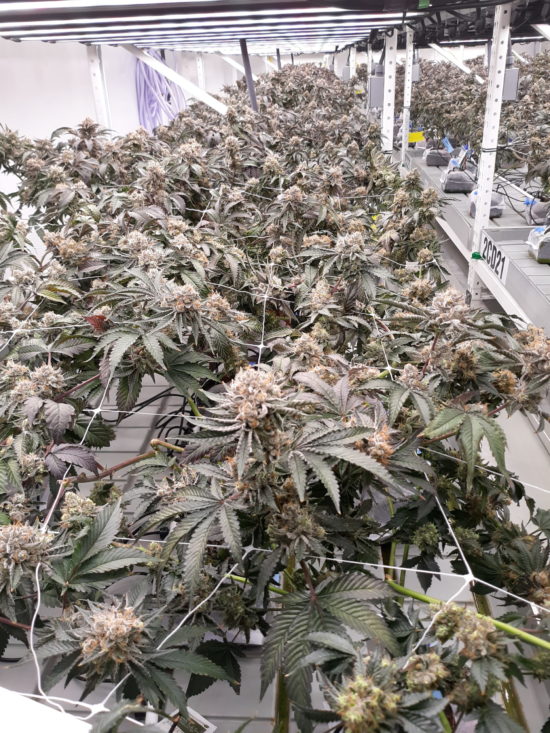
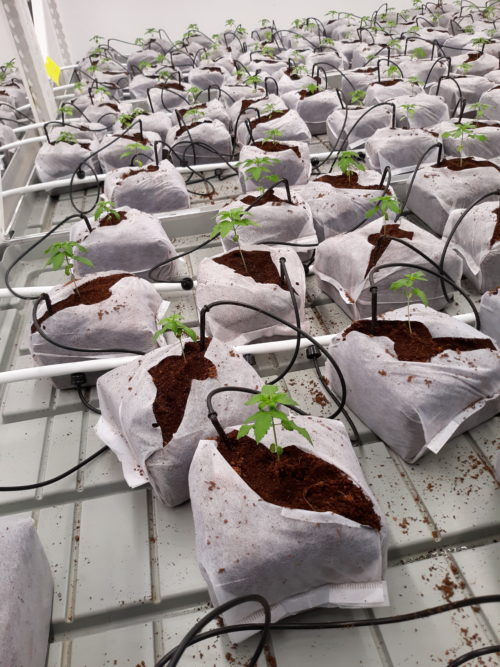
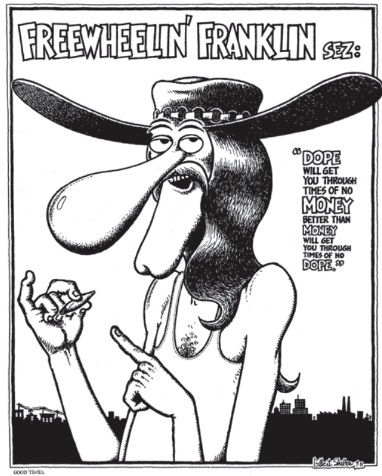
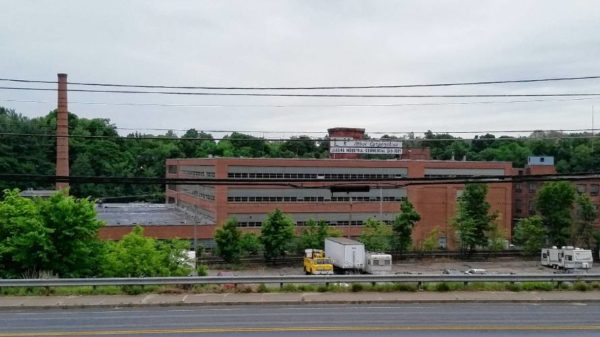
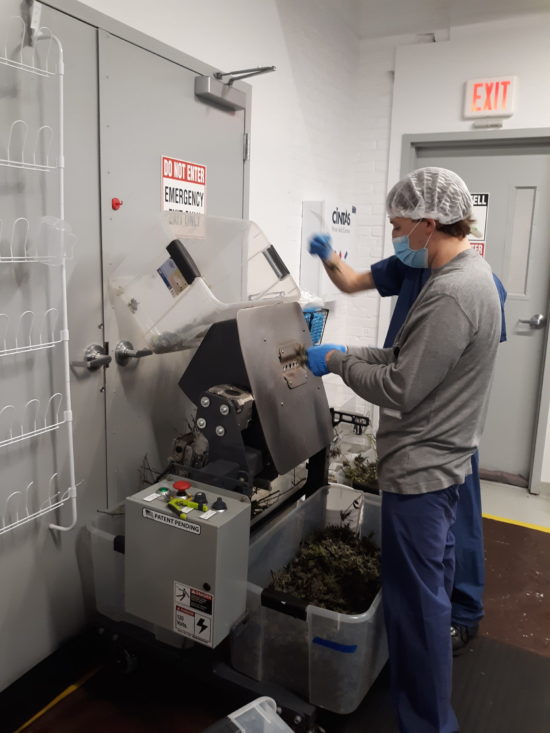
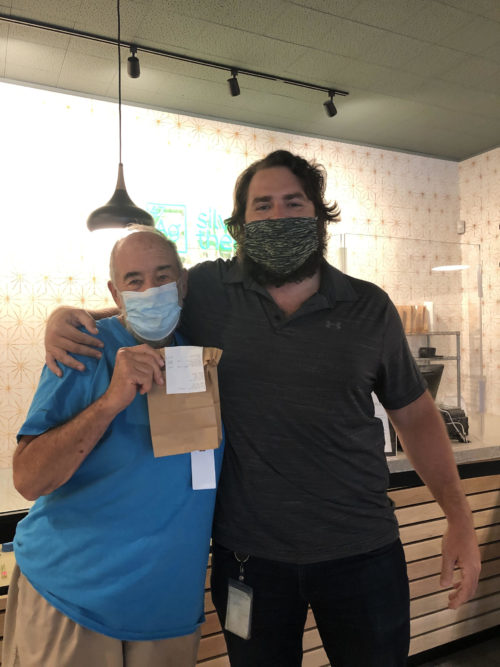

















Thanks, Very entertaining and informative story.
This caption “Small buds at MassGrow” might not be accurate. In the photo those look like baby marijuana plants, not buds because they have not yet produced flowers.
What an interesting, informative article about the commercial development of marijuana, Allen! I am going to save it and read it again as it has so much new info I hadn’t a clue about. I would never have imagined all the wonders that science would have come up with now many decades after my little hippie brother Tom arrived in the 1960’s from Berkley driving his old panel truck across the country “loaded” with simple Mexican pot and LSD 25 on sugar cubes, which financed his trip and which he shared with me while I was teaching high school in Vermont. Tom by the way went back West and, not too much later, was arrested and put in jail for 3 years for growing a few plants of the “holy herb” on his Tolstoy Farm residence in Oregon. But that is another story.
I worked at massgrow. Place was mids as fuck. Every room was hermed out . That guy that gave you the tour and is aka the cultivation director….he ain’t a real grower .
Massgrow lies to everyone coming in the door for sales or interviews. The cultivation supervisor is the man you should of talked to him instead.
The legalized cannabis industry in Massachusetts is evolving rapidly, with businesses navigating both challenges and opportunities. This article provides an interesting look at how dispensaries are shaping the market and what legalization means for communities. Do you think cannabis legalization has been a positive change? For high-quality CBD products, Gethemp offers a variety of legal, high-CBD hemp flowers. Check them out at https://gethemp.co.uk! Always stay informed and choose trusted sources when exploring cannabis products.